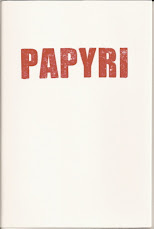1857:
Dans ton île, ô Vénus! je n’ai trouvé debout
Qu’un gibet symbolique où pendait mon image ...
– Ah! Seigneur! donnez-moi la force et le courage
De contempler mon cœur et mon corps sans dégoût !
– Charles Baudelaire, Les Fleurs du Mal (1857)
In your island, Venus, I found nothing upright
save one symbolic gibbet with my image
on it: – God, give me the strength and courage
to see my heart and body in the light,
without disgust ...
Alistair Paterson says of me (or, at any rate, of “Jack Ross”): “Neither his MA thesis, The Novels of John Masefield, nor his doctoral thesis … immediately suggests the kind of writer he is” [Poetry NZ 22 (2001): 10]. This bit of my MA thesis (U. of Auckland, 1986) does, though, I suspect – these lines translated from Baudelaire’s “Voyage to Cythera.”
Michael Onslow-Osborne, in his stimulating article “Pre-millennial Tinnitus: Noise-bytes 1999-2000” [brief 18 (2000): 79-90] appears to end up with white noise as the basis of his poetics: “The world is an outrage, the pertinent answer is noise to block it out.” No disrespect to Michael, but that doesn’t sound very sexy to me. It reminds me a bit of that Ken Russell movie Altered States. You remember, the one where William Hurt keeps on climbing into a deprivation tank and reverting to an apeman. He would have ended up as primordial matter if it hadn’t been for the love of a good woman (Blair Brown).
I want to contemplate my heart and my body without disgust. That’s not an especially easy thing to do. Am I extra disgusting? Worse than the rest of you? It’s hard to say. Asking the question at all implies:
- a strong suspicion the answer may be “yes;”
- an even stronger desire to be assured otherwise.
Is that the beginning and end of my aesthetics? I guess there might be a little more than that. A few scraps of mystical theology, a need to persuade myself that life – my life, your life, any life – can be redeemed somehow, or at any rate palliated if only one takes a passionate enough interest in the detail (“Crush it in your palm like a flower; inhale its fragrance,” as Nabokov advises in his Lectures on Literature).[1]
1. The actual reference is as follows:
Let me submit the following practical suggestion. Literature, real literature, must not be gulped down like some potion which may be good for the heart or good for the brain - the brain, that stomach of the soul. Literature must be taken and broken to bits, pulled apart, squashed - then its lovely reek will be smelt in the hollow of the palm, it will be munched and rolled upon the tongue with relish; then, and only then, its rare flavour will be appreciated at its true worth and the broken and crushed parts will again come together in your mind and disclose the beauty of a unity to which you have contributed something of your own blood.
- Vladimir Nabokov, Lectures on Russian Literature, ed. Fredson Bowers, 1982 (London: Picador, 1983) p. 105.
Poems, Imitations & Translations
Saturday
Case Studies (6):
Subscribe to:
Post Comments (Atom)








.jpg)
No comments:
Post a Comment